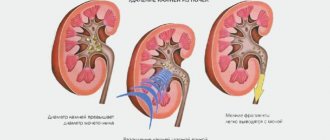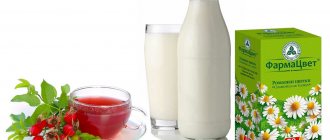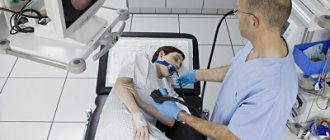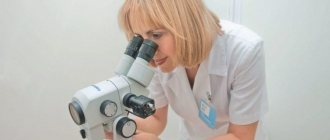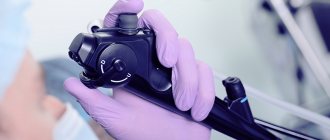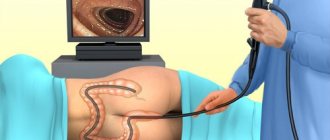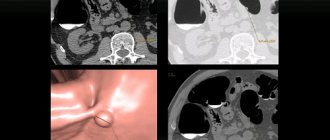Colonoscopy is an endoscopic method of examining the cavity and inner walls of the large intestine. It allows you to detect changes in the mucous membrane characteristic of congenital pathologies, inflammatory processes and neoplasms.
Based on its high diagnostic value, this examination method is increasingly used in clinical practice.
Almost all patients who are prescribed it know how to prepare properly, but what is forbidden to do after the procedure? What can you eat after an intestinal colonoscopy, what foods are temporarily excluded from the patient’s diet, what should a balanced menu look like? These questions often remain unanswered.
About colonoscopy and possible consequences
Colonoscopy is an endoscopic diagnostic method. Allows you to examine the inner surface of the colon and make an accurate diagnosis. Sometimes, simultaneously with the detection of pathology, it is possible to eliminate it, for example, by removing a small polyp or foreign body.
Researcher Subbotin calls colonoscopy “the gold standard for diagnosing diseases of the large intestine” (Subbotin A.M., 2010, p. 1754). Other authors and medical practitioners agree with him. Modern equipment opens up wide opportunities for high-precision diagnostics, allowing timely detection of diseases, areas of inflammation and changes in the mucous membranes. However, at the same time, colonoscopy involves a certain intervention in the digestive system, requires careful preparation, and therefore is not without certain risks.
Typically, relatively severe complications are associated with emergency colonoscopy. This is due to the person’s lack of opportunity to prepare thoroughly, as well as the general serious condition of the patient. That is why the diagnostic procedure is often performed as planned.
However, a planned colonoscopy does not guarantee the absence of complications. Among the most common are disorders of the gastrointestinal tract that persist for some time. Constipation as a consequence of colonoscopy, which occurs after the examination, may be associated with both the preparation and the procedure itself.
In addition, there are certain indications for diagnostics: diseases of the gastrointestinal tract, which themselves cause constipation, or suspicions of them. In this case, the problem does not disappear after a colonoscopy.
Preparation for the procedure involves cleansing the intestines using osmotic laxatives. They provide the conditions necessary for examination, but their use, as well as the need for prolonged fasting, can cause disturbances in intestinal function. These disturbances persist for several days after the procedure. In addition, in the vast majority of cases, diagnosis is carried out under anesthesia, usually short-term, which can lead to impaired intestinal muscle tone and stool retention in the first time after the examination.
Mild consequences also include pneumatosis intestinalis, a condition in which air cysts form on the surface of the mucosa. Shaikhiev in his work points out that “pneumatosis of the colon is associated with inadequate evacuation of air from the intestinal lumen at the end of the study. This condition resolves on its own within the next hour” (Shaikhiev Zh. Zh., 2011, p. 29).
Get rid of intestinal problems
The natural British drug is not addictive and works immediately
Find Fitomucil with benefits
Sample menu
Telling the patient how to eat properly, the specialist draws up a sample menu for the week. The diet for 7 days is presented in the table below.
| Monday | Tuesday | Wednesday | Thursday | Friday | Saturday | Sunday | |
| Breakfast | Low fat cottage cheese | Buckwheat porridge, rosehip decoction | Oatmeal, natural juice | Zucchini casserole | Buckwheat, boiled turkey, green tea | Muesli | Cottage cheese |
| Snack | Boiled egg | Curd mass with the addition of dried apricots | Fish soufflé | Yogurt | Cottage cheese and fruits | Cheesecakes, tea | Boiled egg |
| Dinner | Fish broth, boiled chicken meat | Vegetable soup, rice porridge and cutlet cooked in a steam bath | Chicken broth, vegetable casserole, compote | Vegetable puree soup, steamed meatballs | Fish broth, beet salad, puree | Chicken broth, buckwheat porridge, boiled fish | Vegetable soup, pilaf with veal, berry juice |
| Afternoon snack | Yogurt | Dried fruits | Natural kefir | Apple baked in the oven | Skimmed milk | Yogurt | Ryazhenka |
| Dinner | Rice | Broccoli casserole, green tea | Omelet and fresh tomato | Curd soufflé | Vegetable casserole | Fish cutlet, zucchini puree | Vegetable casserole with meat |
Despite the fact that colonoscopy is a minimally invasive procedure, it requires compliance with certain recommendations not only before the procedure, but also after it.
To avoid complications and normalize the functioning of the intestinal tract as quickly as possible, you should not neglect the nutritional advice given by your doctor.
Preventing constipation after colonoscopy
Prevention of constipation after colonoscopy begins at the preparation stage. So, the doctor will prescribe a suitable laxative for complete cleansing and give recommendations regarding the use of other medications.
It is important to adhere to a special diet some time before the diagnostic procedure. This will help improve visualization of the inner surface of the intestine, eliminate the formation of large amounts of gas and reduce the likelihood of complications. Lack of thorough preparation may lead to the need to repeat the procedure, so you should not neglect preparation.
In order to prevent disturbances in bowel function after endoscopic intervention, it is important to adhere to the recommendations of a specialist. Your doctor may prescribe the following medications:
- analgesics for pain relief;
- defoamers, sorbents to eliminate increased gas formation: with low risks of developing constipation;
- laxatives;
- prebiotics to normalize intestinal microflora.
If there are no contraindications to moderate physical activity, it is important to move. Light exercise and walking are suitable. It is better to avoid heavy loads.
Compliance with the drinking regime is of great importance in the prevention of constipation in general and after colonoscopy in particular. It is important to drink up to 2 liters of water per day to ensure normal bowel function and normal stool consistency. If you take diuretics, ask your doctor how much fluid you need per day.
When determining the required volume of water, we need to take into account all the liquid that we consume per day: tea, soups, vegetables, fruits (they also contain water). But none of the above can completely replace water; it will only reduce the required volume.
After the intervention, it is important to adhere to a special diet. The principles of postoperative diets are suitable, but not with such strict restrictions. So, the daily menu should include cereals, lean meats and fish, and fermented milk products. You need to avoid smoked meats, marinades, spicy foods, fried and fatty foods, as well as ready-to-eat foods - sausages, confectionery, etc.
If constipation may occur due to a disease of the digestive system, seek your doctor's recommendations for prevention.
Complications
Colonoscopy is a safe procedure and complications are rare but can occur.
Bleeding may occur after a biopsy or polyp removal, but it is usually minimal and stops quickly or can be controlled. A colonoscope can cause a tear or hole in the tissue being examined, which is a serious problem but fortunately very rare. Adverse reactions to sedatives are possible (providing information from you about previous drug allergies or reactions and about health problems such as heart, lung, kidney or liver disease ensures a safe examination). You will also be closely monitored during the examination.
Diet for constipation after colonoscopy
Nutrition for constipation after colonoscopy is fundamental. A special diet will help normalize intestinal function and restore regular bowel movements.
Doctors highlight several key principles of nutrition after endoscopic interventions:
- Mechanical protection of mucous membranes and intestinal walls. This explains the need to avoid solid food particles. On the first day, it is important to eat pureed foods.
- Reducing gas formation. To eliminate pain associated with stretching of the intestinal walls, it is important to avoid foods that cause increased gas formation.
- Softening of feces. The condition is especially important for elderly patients. This is facilitated by a sufficient amount of fiber in the diet.
- Fractional meals. Portions should be smaller, and you should eat food more often - up to 6 times a day. Thanks to this, food will be better absorbed, and the load on the digestive system will be low.
- Individual approach. When compiling a diet, the individual characteristics and health status of a person are taken into account. Thus, even products approved for consumption if the patient is allergic to them are strictly excluded from the menu. The same applies to fermentopathy.
Allowed products include lean meats, fish, and poultry. Preference should be given to baked or boiled dishes. Steamed cutlets are allowed.
The diet may include steamed omelettes, mashed potatoes, day-old bread, mild cheeses, and cereals - buckwheat and oatmeal.
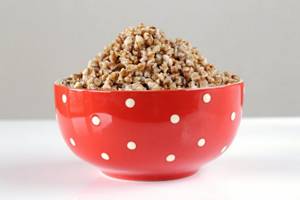
Salads made from fresh vegetables will provide the body with the necessary amount of plant fiber. You can add herbs to them - dill and parsley. Apples and pears are allowed as fruits. Curd puddings, mousses, sweet jelly, juices, and berries are suitable as desserts. You can drink rosehip decoction, green tea, chamomile decoction, still mineral water, regular drinking water.
The list of prohibited products includes the following:
- soda;
- strong tea and coffee;
- kvass;
- legumes;
- rice, semolina and pearl barley porridge;
- fried foods;
- sauces, including those with the addition of vinegar;
- fresh bakery;
- canned food, marinades;
- peppered dishes;
- grapes, grape juice;
- whole milk, cream;
- spicy types of cheese;
- mushrooms;
- spinach, turnip, horseradish, radish;
- semi-finished products, sausages.
The first food after the procedure should be liquid or puree. For dinner, porridge without butter or mashed potatoes is allowed. Already from the second day, you can restore a full diet, adhering to the rules of nutrition. It is necessary to follow such a diet even if you are feeling well. The doctor will tell you how long it will take to recover.
If a colonoscopy was performed in connection with already diagnosed diseases of the gastrointestinal tract, which required adherence to a certain diet, it is important to consult a doctor and find out whether additional restrictions are imposed.
Prohibited Products
Excluded from food:
- Fried meat products, fish;
- Sausages, canned products, smoked meat, pickles, marinades;
- Whole grain porridge;
- Lentils, chickpeas, beans, peas, rice;
- Confectionery;
- Bakery;
- Pasta;
- Radish, radish, onion, garlic;
- Mushrooms in any form;
- Fried egg;
- Freshly ground coffee;
- Products containing cocoa beans;
- Alcohol;
- Spicy, fatty dishes.
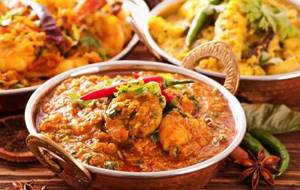
How to use fiber correctly
An adult should receive from 25 to 35 grams of fiber per day so that his gastrointestinal tract functions stably and predictably. This amount is quite difficult to obtain from diet alone, even if your diet includes vegetables and legumes - the main sources of dietary fiber. Therefore, you can choose an effective drug for yourself.
One of them is the English drug “Fitomucil Norm”. It does not contain preservatives, flavor enhancers or dyes. It contains only plant components:
- plantain seed shell (psyllium);
- dried home plum fruits.
“Fitomucil Norm” is packaged in portioned packages. The contents of the sachet should be mixed with a glass of liquid at room temperature and drunk. Drink a glass of water. In case of constipation, it is generally important to maintain a drinking regime: at least 1.5–2 liters per day. The product gently stimulates the intestines and does not cause pain or bloating. You will find detailed information about the drug on the website.
General recommendations
One of the most informative and effective methods of examining the intestines is colonoscopy. To carry it out, special preparation of the patient is required, which implies maximum bowel cleansing. For urgent diagnosis, enemas and laxatives are most often used. If longer preparation for a colonoscopy is possible, the diet guarantees more thorough cleaning, and accordingly increases the effectiveness of the procedure itself. Preparing for a colonoscopy usually begins a week in advance, and it is especially important to follow your diet during the last 48 hours.
